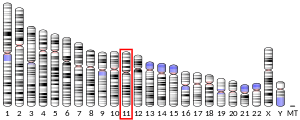SLC22A10
Solute carrier family 22 member 10 (SLC22A10), also known as organic anion transporter 5 (OAT5), is a protein that in humans is encoded by the SLC22A10 gene.[3][4]
| SLC22A10 | |||||||||||||||||||||||||
|---|---|---|---|---|---|---|---|---|---|---|---|---|---|---|---|---|---|---|---|---|---|---|---|---|---|
| Identifiers | |||||||||||||||||||||||||
| Aliases | SLC22A10, OAT5, hOAT5, solute carrier family 22 member 10 | ||||||||||||||||||||||||
| External IDs | OMIM: 607580 HomoloGene: 111144 GeneCards: SLC22A10 | ||||||||||||||||||||||||
| |||||||||||||||||||||||||
| Orthologs | |||||||||||||||||||||||||
| Species | Human | Mouse | |||||||||||||||||||||||
| Entrez |
| ||||||||||||||||||||||||
| Ensembl |
| ||||||||||||||||||||||||
| UniProt |
| ||||||||||||||||||||||||
| RefSeq (mRNA) |
| ||||||||||||||||||||||||
| RefSeq (protein) |
| ||||||||||||||||||||||||
| Location (UCSC) | Chr 11: 63.14 – 63.37 Mb | n/a | |||||||||||||||||||||||
| PubMed search | [2] | n/a | |||||||||||||||||||||||
| Wikidata | |||||||||||||||||||||||||
| |||||||||||||||||||||||||
References
- GRCh38: Ensembl release 89: ENSG00000184999 - Ensembl, May 2017
- "Human PubMed Reference:". National Center for Biotechnology Information, U.S. National Library of Medicine.
- "Entrez Gene: solute carrier family 22".
- Sun W; Wu RR; van Poelje PD; Erion MD (May 2001). "Isolation of a family of organic anion transporters from human liver and kidney". Biochem. Biophys. Res. Commun. 283 (2): 417–22. doi:10.1006/bbrc.2001.4774. PMID 11327718.
Further reading
- Wang AG, Yoon SY, Oh JH, et al. (2006). "Identification of intrahepatic cholangiocarcinoma related genes by comparison with normal liver tissues using expressed sequence tags". Biochem. Biophys. Res. Commun. 345 (3): 1022–32. doi:10.1016/j.bbrc.2006.04.175. PMID 16712791.
- Eraly SA; Nigam SK (2002). "Novel human cDNAs homologous to Drosophila Orct and mammalian carnitine transporters". Biochem. Biophys. Res. Commun. 297 (5): 1159–66. doi:10.1016/S0006-291X(02)02343-4. PMID 12372408.
- Strausberg RL, Feingold EA, Grouse LH, et al. (2002). "Generation and initial analysis of more than 15,000 full-length human and mouse cDNA sequences". Proc. Natl. Acad. Sci. U.S.A. 99 (26): 16899–903. doi:10.1073/pnas.242603899. PMC 139241. PMID 12477932.
- Taylor TD, Noguchi H, Totoki Y, et al. (2006). "Human chromosome 11 DNA sequence and analysis including novel gene identification". Nature. 440 (7083): 497–500. doi:10.1038/nature04632. PMID 16554811.
This article incorporates text from the United States National Library of Medicine, which is in the public domain.
This article is issued from Wikipedia. The text is licensed under Creative Commons - Attribution - Sharealike. Additional terms may apply for the media files.

